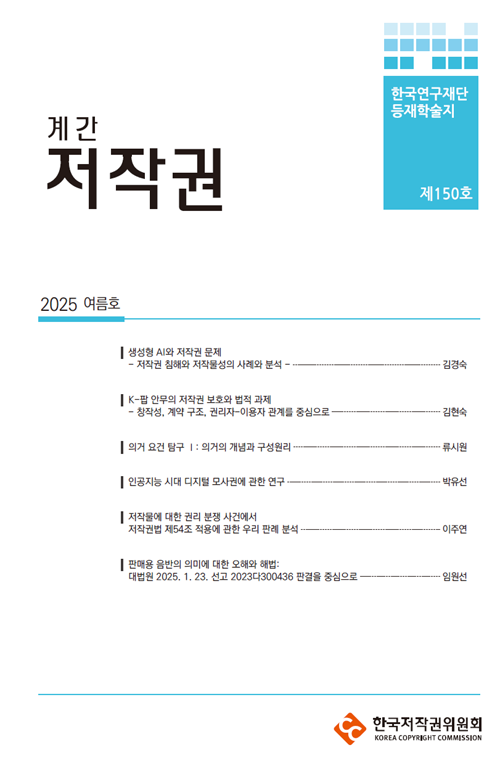- 영문명
- Generative AI and Copyright Issues : Cases and Analysis of Copyright Infringement and Copyrightability
- 발행기관
- 한국저작권위원회
- 저자명
- 김경숙(Kyungsuk Kim)
- 간행물 정보
- 『계간 저작권』150호(38권 2호), 5~54쪽, 전체 50쪽
- 주제분류
- 법학 > 민법
- 파일형태
- 발행일자
- 2025.06.30
무료
구매일시로부터 72시간 이내에 다운로드 가능합니다.
이 학술논문 정보는 (주)교보문고와 각 발행기관 사이에 저작물 이용 계약이 체결된 것으로, 교보문고를 통해 제공되고 있습니다.

국문 초록
생성형 인공지능(Generative AI)의 비약적 발전으로 누구나 손쉽게 문학, 음악, 미술 등 다양한 창작물을 제작할 수 있는 시대가 도래하였다. 특히 대규모 저작물 학습을 통해 콘텐츠를 생성하는 딥러닝 기반 생성형 AI는 기존 저작권 체계에 대한 심대한 도전을 제기하고 있다. 본 논문에서는 생성형 AI와 관련하여 국내외에서 진행 중인 저작권 소송 사례 중 일부 판결을 분석하고, 이를 통해 제기되는 저작권법상의 주요 쟁점을 크게 두 가지 문제—① AI 학습 및 이용 단계에서의 저작권 침해 문제, ② AI 생성물의 저작물성 인정 문제—로 구분하여 그 법적 함의를 고찰하였다.
우선 AI 학습 단계에서의 무단 복제, 권리관리정보(CMI)의 제거 및 변경, 보상 없는 이용 등이 저작권 침해로 문제 되며, 학습에 이용된 저작물과 생성된 콘텐츠 간의 실질적 유사성이 있을 경우 이용 단계에서도 침해가 발생할 수 있다. 아울러 AI 플랫폼이 온라인서비스제공자(OSP)로서 이용자의 침해 행위를 유도한 경우에는 간접책임의 가능성도 제기된다. 다음으로 AI 생성물의 저작물성 문제에 대해서는 인간의 창작성이 개입되지 않은 AI 생성물(AI-generated output)과 인간이 창작적으로 기여한 AI를 도구로 한 생성물(AI-assisted output)로 구분하여 저작물성을 판단할 필요가 있다. 미국 저작권청과 한국 저작권위원회의 실무 기준 역시 이러한 구분을 바탕으로 저작권 등록 여부를 판단하고 있다.
본 연구는 AI 기술의 상용화에 따라 이론적으로 논의되던 저작권 문제가 실제 판례 및 사례에서 법적 쟁점으로 적용되고 있음을 보여주며, 기존 저작권법이 생성형 AI 환경에 어떻게 적용되고 해석될 수 있는지에 대한 중요한 시사점을 제공한다.
영문 초록
With the rapid advancement of generative AI, anyone can easily produce creative works in fields such as literature, music, and visual art. In particular, deep learning-based generative AI systems that generate content by training on large volumes of existing copyrighted works pose a significant challenge to the existing copyright framework.
Based on selected copyright litigation cases related to generative AI, this paper analyzes and examines two major legal issues under copyright law: (1) Copyright infringement during the training and use of AI models, and (2) The copyrightability of AI-generated outputs.
In the AI training phase, the unauthorized reproduction of copyrighted works, removal or alteration of CMI, and unauthorized use can constitute copyright infringement. Furthermore, if the AI-generated output is substantially similar to the original works used in AI training, the use of such outputs may also result in infringement. Additionally, when AI platforms act as OSPs and induce or facilitate infringing behavior by users, questions of secondary liability may arise.
Regarding copyrightability, it is important to distinguish between AI-generated outputs, which involve no human creative input, and AI-assisted outputs, which incorporate human creative contributions using AI as a tool. Both the U.S. Copyright Office and the Korea Copyright Commission have adopted this distinction as a basis for determining copyright registration eligibility in their respective practices.
This study provides valuable insights into the potential application and interpretation of existing copyright law in the context of generative AI.
목차
Ⅰ. 서론
Ⅱ. 저작권 침해 문제
Ⅲ. AI 생성물의 저작물성
Ⅳ. 결론
참고문헌
키워드
해당간행물 수록 논문
참고문헌
교보eBook 첫 방문을 환영 합니다!

신규가입 혜택 지급이 완료 되었습니다.
바로 사용 가능한 교보e캐시 1,000원 (유효기간 7일)
지금 바로 교보eBook의 다양한 콘텐츠를 이용해 보세요!



